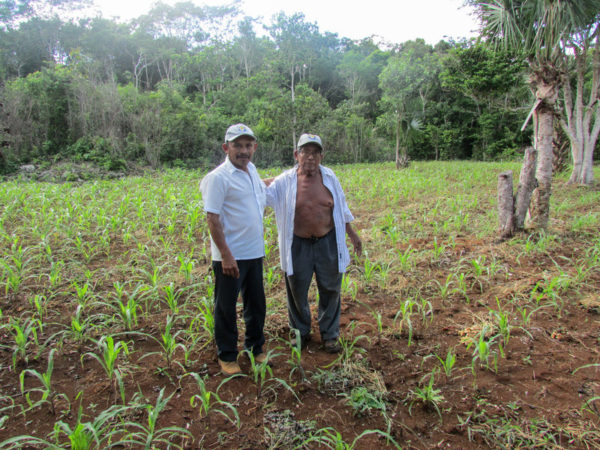Freelance journalist Gabriel Popkin used support from the Institute for Journalism and Natural Resources and the Society for Environmental Journalism to research this report on new Mayan farming techniques for National Public Radio.
Dionisio Yam Moo stands about four-and-a-half-feet tall, and his skin is weathered from years in the tropical sun. A “proudly Mayan” farmer, he grows corn, beans and vegetables on a six-hectare farm in Mexico’s Yucatán peninsula. The farm is surrounded by dense tropical forest, and crops grow amid fruit trees in thin soil, with the peninsula’s limestone bedrock protruding in places.
Yam Moo farms using a traditional, rainfed practice called milpa, which has long involved cutting and burning patches of forest, planting crops for a few years, then letting the worn-out land regenerate for up to 30 years, before cultivating it again. Milpa has enabled generations of farmers like Yam Moo overcome the Yucatán’s poor, thin soil and grow a stunningly diverse set of crops — multiple varieties of beans, squash, chili peppers, leafy greens, root vegetables, spices and corn, the plant at the heart of Mayan identity.
In recent years, however, Yam Moo and other Yucatán milperos have struggled to keep their farms alive. Climate change has brought erratic rainfall, making the growing season less predictable. Yam Moo says he has always planted his corn in May. But in 2015 for example, he says the rains didn’t come until August. And then it flooded. He lost most of his crop, he says. Because milpa farming depends entirely on rainfall, which is never fully predictable, “there has always been a level of uncertainty, and the Maya have dealt with that for millennia,” says José Martínez Reyes, an anthropologist at the University of Massachusetts Boston. “But with climate change, I think that uncertainty has grown exponentially.”
Years of unpredictable rainfall and failed crops pushed Yam Moo to find a solution, and it’s one that could in turn help fight climate change. Along with other farmers in the area, he developed a modified milpa called “milpa maya mejorada” or “improved Mayan milpa.” Yam Moo no longer cuts down new forests, but he still grows the same diversity of crops. And he has incorporated into the ancient practice a host of modern techniques that help him farm despite the more unpredictable rains. A recently installed irrigation system, which relies on an above-ground rain water collector (the Yucatán has almost no surface water) ensures that Yam Moo can survive droughts. And he has found that by tilling in compost, chicken manure and other organic additions, he can grow far more crops per hectare. The added nutrients keep the soil healthy and productive, meaning he doesn’t need to clear new ground as often, or perhaps at all.
To read complete article click here.
Source: npr.org


